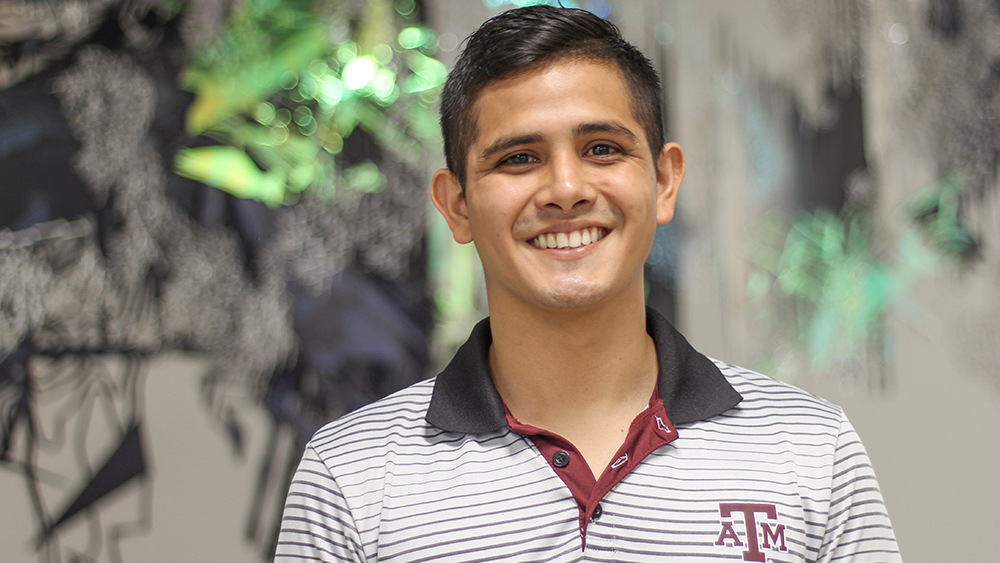
When asked, William Villalobos ’21 often explains what petroleum engineering involves and why he enjoys studying the subject. While this type of engagement is typical for students in the Harold Vance Department of Petroleum Engineering at Texas A&M University, this undergraduate actively seeks ways to open a dialog on the subject. Currently, he is organizing a summit at Texas A&M involving students, a representative from the Texas Railroad Commission and oilfield professionals to discuss health, safety and the environmental aspects of oilfield operations.
Villalobos took the time to answer questions and share his thoughts on why all petroleum engineers, and the public, should be familiar with the more positive aspects of the oil and gas industry.
Q: Did you have any contact with the oil and gas industry while growing up?
A: Yes. I moved to an oilfield town in East Texas called Winnsboro when I was about eight years old. Before then, I lived in Peru and the Dallas area. While in Winnsboro, my stepdad introduced me to the inner workings of the oil field through his oil field construction company, which often assembled production equipment and conducted other labor-intensive oil field operations.
Q: What were your college degree plans?
A: I attended Northeast Texas Community College fresh out of high school and graduated with an associate’s degree in science. Then I transferred to Texas A&M to pursue a bachelor’s degree in either petroleum or chemical engineering. I ended up finding petroleum engineering more interesting.
Q: Why did you choose petroleum engineering?
A: As a field hand for B&K Construction, I considered my knowledge of the construction of drilling sites, pipelines and production equipment to be a great stepping stone toward a petroleum engineering degree. Also, an uncle who worked as a petroleum engineer spoke highly of the position and helped me decide to pursue this field.
Q: Why come to Texas A&M?
A: Out of all the petroleum engineers I worked with, the Aggies would spend their spare time teaching me some of the basic principles of daily drilling and production operations. These generous actions encouraged me to attend Texas A&M, which, in my opinion, is the best and most reputable institution for this career path.
Q: Have any other work experiences shaped your goals?
A: Yes. During my internship with Dimock Operating Company, the owner explained to me how to handle small business negotiations, meet regulatory compliance with the Texas Railroad Commission and maintain worker safety during workover operations. Since then, my goals have always included emphasizing regulatory and safety relations for drilling engineers.
Q: Are there any other experiences you’d like to mention?
A: As a lab assistant in the petroleum engineering department, I participated in gas and chemical research. The most interesting findings to me were the minimum miscible pressures of varying gas combinations for unconventional reservoirs, the function of huff-n-puff pressure injections and how flue gases, usually a waste product, could be used to enhance hydraulic fracturing operations.
Q: Are you involved with student organizations?
A: I’m a current member and the former chairman of the International Association of Drilling Contractors (IADC) student chapter. During my tenure as chairman, I was able to introduce students of all majors to oil-field related professional development workshops, rig tours, sponsored conferences and unconventional operations.
Q: How do you think the industry is doing with awareness and engagement?
A: There is room for improvement. To date, the negative publicity about the industry has been more successful at engaging new students. While there are valid negative points, there are also positive aspects that the oil industry provides for society. For example, this industry produces energy and materials needed for medical supplies, cosmetics, battery advancement technologies, etc. And it utilizes advanced technological resources to improve extraction methods.
Students are usually amazed by the robotic systems, fluid mechanics systems and well-logging tools I mention during my brief discussions with them, so I think raising awareness about these technologies would improve new student engagement.
Q: Why take on organizing a summit?
A: I found myself always having to explain what petroleum engineering is and my reasons for choosing this particular career path. Feedback from these conversations led me to wonder how academics, state regulators and industry representatives interacted with each other and the public on a daily basis.
Because of my involvement with IADC, I was able to organize a summit for April 2021 to include Texas Railroad Commissioner representative Christi Craddick, a process safety director, and oilfield professionals. Through this summit, I hope to educate the public, especially students, about oil and gas health, safety and environmental operations.
I consider this to be a positive and beneficial engagement with the next generation.